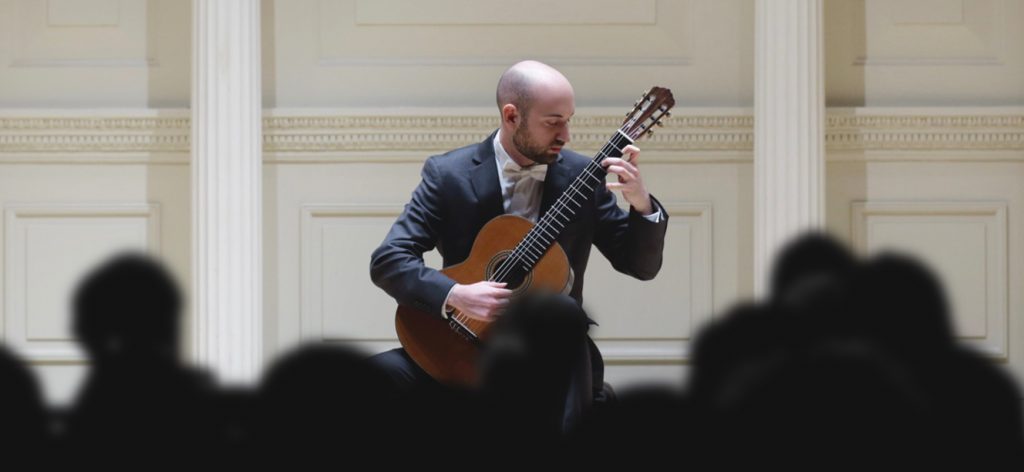by Mike Telin

On Saturday, March 20 at 7:30 pm, Buono will make his Cleveland Classical Guitar Society International Series debut with an online program that will feature music by J.S. Bach, Franz Schubert, Hans Haug, and Gerard Drozd. The pre-recorded concert is free. Click here to receive links to the performance as well as to a post-concert Zoom reception with the artist, plus a copy of the full concert program.
Born in Turin, Italy in 1987, Buono began his musical studies at a young age. He went on to attend the Giuseppe Verdi Conservatory in Milan and later the Accademia Chigiana of Siena. He first broke onto the international concert scene in 2008 when he was awarded the Golden Guitar as the best young concert-player of the year at the XIII International Guitar Competition and Festival of Alessandria (Italy). In 2009, he won the Gold Medal at the International Christopher Parkening Competition (USA).
In addition to being awarded top prizes at many international competitions, his concert appearances have taken him to Carnegie Hall’s Weill Hall (New York), the Konzerthaus in Vienna (Austria), Manuel de Falla Hall in Madrid (Spain), Hermitage Theatre in St. Petersburg (Russia), Lysenko Hall in Kiev (Ukraine), Stadtcasino in Basel (Switzerland), and the International House of Music in Moscow (Russia).
I continued our email conversation by asking Buono what first attracted him to the guitar.
Emanuele Buono: Being able to produce a sound through direct contact with the strings. Feeling the instrument vibrate and the smell of the wood. The instrument’s sensitivity in changing tension and sound depending on the humidity and the various color possibilities.
Mike Telin: You’ll begin your program with Bach’s Flute Partita in a. With so much Bach to choose from, why did you select this piece?
EB: I love all of Bach’s music, but I find that there is a lyricism in his works for flute that translates particularly well to the guitar. Especially this Partita. In some places it works so well on the guitar that it seems to me that it was born on this instrument.
MT: The three Schubert Lieder — Aufenthalt, Lob der Tränen, and Ständchen — are beautiful. How much do the words influence your interpretation?
EB: When I first decided to play these pieces I didn’t know the lyrics — I chose them because I was attracted to the music. After reading the words, I realized that my way of interpreting them was not very far from the melancholy atmosphere and desire that surrounds them. In any case, I don’t try to describe the context through music, I prefer to listen to what my mood suggests to me when I play.
MT: Hans Haug’s Prélude, Tiento et Toccata is such an amazing composition.
EB: For some time I have been dedicating myself to listening to all of the works from the Segovia archive. Among the various pieces that the Maestro didn’t perform, I find this composition to be one of the most interesting.
There are influences of the French Impressionist composers and Spanish influences due to Haug’s contact with Segovia. There’s an interesting re-use of early musical forms such as tiento and toccata, but through his very particular language. The piece fascinated me from the first listen. I’m happy to be able to play it because, like all pieces written by composers who are not guitarists (Haug was a conductor) the piece is not at all idiomatic — certain passages are very difficult to play on the guitar.
MT: Gerard Drozd’s Adagio, Op. 44, is an homage to Bach.
EB: I liked the idea of opening with Bach and ending with an homage to Bach. Generally I like to close with a brilliant and virtuosic piece, but for the moment we live in, this was the most appropriate one. The piece has a very intimate atmosphere that reflects our current reality. It is characterized by a walking bass line and melodic elements that refer to many of Bach works — obviously re-harmonized in a modern language.
MT: With so many concerts being streamed because of the pandemic, many musicians have had to learn a lot about technology in a very short amount of time. Is this true for you or have you always been a “techie?”
EB: It’s true! I had to learn how to handle microphones, cables, tripods, etc. Initially it was traumatic but now I’m happy to be able to record independently. I still have a lot to learn and improve on, but I am satisfied with the result. The hardest thing was finding the concentration to manage everything at the same time — music, audio, and video.
MT: What do you do when you’re not playing the guitar?
EB: I like spending time with my wife and son — going for a walk, watching a football match, very simple things.
MT: Thanks so much for answering my questions. Is there anything else that you would like to tell the readers?
EB: Keep enjoying music and stay healthy!
Published on ClevelandClassical.com March 16, 2021.
Click here for a printable copy of this article



